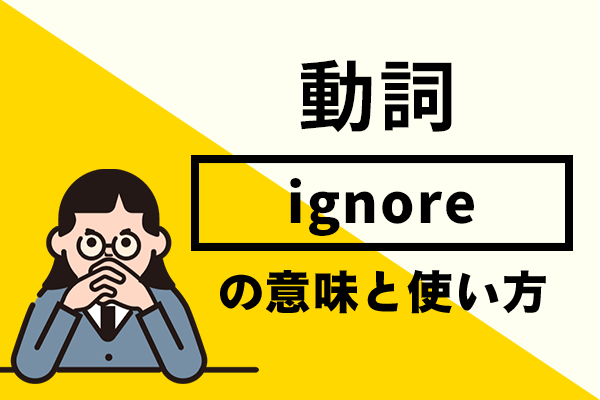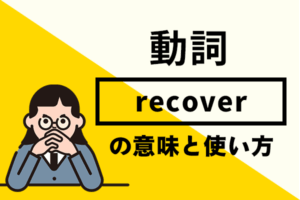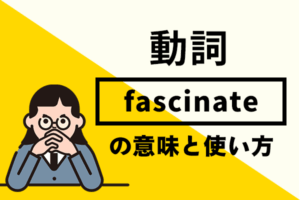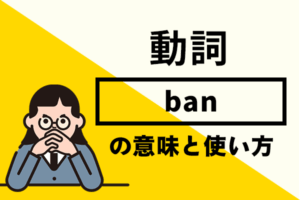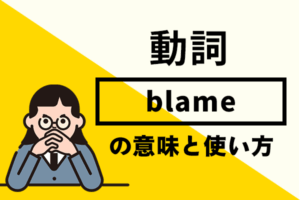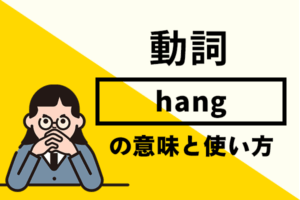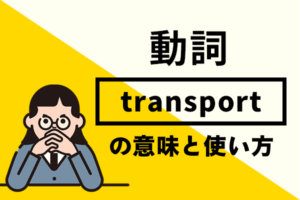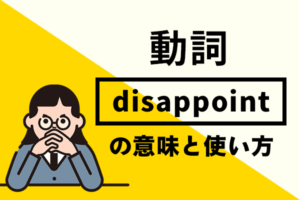ignoreは英語学習者にとって重要な基本動詞の一つです。
「無視する」という日本語訳だけでは捉えきれない、微妙なニュアンスと使い方があります。
特にneglectやdisregardといった類義語との使い分けは、TOEICや英検でも頻出のポイントです。
この記事では、ignoreのコアイメージから実践的な使い方まで、詳しく解説していきます。
ignoreのコアイメージ
ignoreの語源はラテン語の「ignorare(知らない)」に由来します。
コアイメージは「意図的に存在を認識しない・気づかないふりをする」です。
何かや誰かが存在していることを認識しているにもかかわらず、あえて反応しない・注意を払わないという意味合いが含まれます。
単に「知らない」のではなく、「知っているのに無視する」という意図性がポイントです。
ignoreの基本情報
| 項目 | 内容 |
|---|---|
| 単語 | ignore |
| 発音 | /ɪɡˈnɔːr/(イグノア) |
| 品詞 | 動詞 |
| 語源 | ラテン語 ignorare(知らない) |
| 活用形 | 形 |
|---|---|
| 原形 | ignore |
| 三人称単数現在 | ignores |
| 過去形 | ignored |
| 過去分詞 | ignored |
| 現在分詞 | ignoring |
ignoreは他動詞として使われ、必ず目的語を伴います。
前置詞を必要としない点が特徴的で、「ignore + 目的語」という形が基本です。
発音・アクセントの注意
ignoreの発音は /ɪɡˈnɔːr/ で、第2音節の「nore」にアクセントがあります。
日本語話者は「イグノール」と発音しがちですが、正しくは「イグノア」です。
特に注意すべき点:
・第1音節の「i」は短母音 /ɪ/(「イ」)
・第2音節の「o」は長母音 /ɔː/(「オー」)
・語末の「e」は発音せず、「r」の音で終わる
She ignored my message.
彼女は私のメッセージを無視した。
この例文を発音する際も、「イグノアド」と発音し、「ignored」の語末はしっかり /d/ の音を出します。
ignoreの意味とニュアンス
〜を無視する・見て見ぬふりをする
最も基本的な意味で、人や物事を意図的に無視することを表します。
相手の存在や行動を認識しているにもかかわらず、反応しないという意味合いです。
He ignored my phone calls all day.
彼は一日中私の電話を無視した。
The teacher ignored the student’s question.
先生はその生徒の質問を無視した。
Don’t ignore the warning signs.
警告サインを無視してはいけない。
〜を軽視する・重要視しない
何かの重要性や存在を認めない、軽く扱うという意味でも使われます。
完全に無視するのではなく、十分な注意を払わないというニュアンスです。
We cannot ignore the environmental impact.
環境への影響を軽視することはできない。
The company ignored safety regulations.
その会社は安全規制を軽視した。
Politicians often ignore public opinion.
政治家はしばしば世論を軽視する。
〜に気づかないふりをする
実際には認識しているのに、わざと気づいていないふりをすることを表します。
社交的な場面や対人関係でよく使われる表現です。
I saw him at the party, but he ignored me.
パーティーで彼を見かけたが、彼は私に気づかないふりをした。
She walked past and ignored his greeting.
彼女は通り過ぎて、彼の挨拶を無視した。
Try to ignore the pain and keep moving.
痛みに気づかないふりをして動き続けてください。
ignoreの使い方
ignore + 人
人を無視する場合、「ignore + 人」の形を使います。
対人関係で最も頻繁に使われるパターンです。
He completely ignored me at the meeting.
彼は会議で私を完全に無視した。
Why are you ignoring your best friend?
なぜ親友を無視しているのですか?
The manager ignored the employee’s concerns.
マネージャーは従業員の懸念を無視した。
ignore + 物事
メッセージ、助言、規則、事実などの物事を無視する場合も同じ構文です。
ビジネスや公式な文脈でよく使われます。
You should not ignore doctor’s advice.
医者の助言を無視すべきではありません。
The driver ignored the traffic light.
運転手は信号を無視した。
We can’t ignore the facts.
事実を無視することはできない。
ignore + that節
「〜ということを無視する」という意味で、that節を伴うこともあります。
やや形式的な表現です。
We cannot ignore that the situation is getting worse.
状況が悪化しているという事実を無視できない。
The report ignored that many workers were dissatisfied.
報告書は多くの労働者が不満を持っているという事実を無視した。
Don’t ignore that you need professional help.
専門家の助けが必要だという事実を無視してはいけない。
ignoreの句動詞
ignoreは基本的に単独の動詞として使われ、特定の前置詞や副詞と結びついた句動詞は一般的ではありません。
他の動詞のように「ignore up」「ignore out」といった表現は存在しません。
ただし、以下のような副詞と組み合わせて使われることがあります。
【completely/totally ignore】
「完全に無視する」という意味で、無視の程度を強調します。
日常会話でもビジネスでも頻繁に使われる表現です。
He completely ignored my suggestions.
彼は私の提案を完全に無視した。
The government totally ignored the protesters’ demands.
政府は抗議者の要求を完全に無視した。
She totally ignored the deadline.
彼女は締め切りを完全に無視した。
【deliberately/intentionally ignore】
「意図的に無視する」という意味で、無視が故意であることを明示します。
批判的なニュアンスを含むことが多い表現です。
He deliberately ignored the safety procedures.
彼は意図的に安全手順を無視した。
The company intentionally ignored customer complaints.
会社は意図的に顧客の苦情を無視した。
Don’t deliberately ignore your responsibilities.
意図的に責任を無視してはいけない。
ignoreのコロケーション
| コロケーション | 意味 | 例文 |
|---|---|---|
| ignore advice | 助言を無視する | He ignored my advice and failed. |
| ignore warnings | 警告を無視する | Don’t ignore the warnings. |
| ignore rules | ルールを無視する | Students who ignore rules will be punished. |
| ignore requests | 要求を無視する | The manager ignored our requests. |
| ignore problems | 問題を無視する | We can’t ignore the problem anymore. |
| ignore evidence | 証拠を無視する | The court cannot ignore this evidence. |
| ignore complaints | 苦情を無視する | The company ignored customer complaints. |
| ignore messages | メッセージを無視する | Why are you ignoring my messages? |
ignoreを使った例文
試験でよく出る例文
The committee ignored the public’s concerns.
委員会は市民の懸念を無視した。
Scientists cannot ignore new evidence.
科学者は新しい証拠を無視できない。
The company has ignored safety regulations for years.
その会社は何年もの間、安全規制を無視してきた。
We should not ignore the warning signs of climate change.
気候変動の警告サインを無視すべきではない。
The report ignored important factors.
その報告書は重要な要素を無視した。
日常会話で使う例文
Why are you ignoring me?
なぜ私を無視しているの?
He’s been ignoring my calls all week.
彼は一週間ずっと私の電話を無視している。
Just ignore him and he’ll stop bothering you.
彼を無視すれば、あなたを困らせるのをやめるでしょう。
I can’t ignore the noise from next door anymore.
もう隣からの騒音を無視できない。
She ignored my greeting and walked away.
彼女は私の挨拶を無視して立ち去った。
Please don’t ignore what I’m saying.
私が言っていることを無視しないでください。
ビジネス文書・メールで使う例文
We cannot ignore the market trends.
市場の動向を無視することはできません。
The management ignored employee feedback.
経営陣は従業員のフィードバックを無視しました。
Please do not ignore this important notice.
この重要なお知らせを無視しないでください。
The board decided to ignore the minority shareholders’ proposal.
取締役会は少数株主の提案を無視することを決定しました。
Our competitors are ignoring emerging technologies.
競合他社は新興技術を無視しています。
We should not ignore customer satisfaction scores.
顧客満足度スコアを無視すべきではありません。
ignoreの類義語・関連語
| 単語 | 品詞 | ニュアンス・解説 |
|---|---|---|
| neglect | 動詞 | 怠る・放置する(責任や義務を果たさない) |
| disregard | 動詞 | 軽視する・無視する(形式的・意図的) |
| overlook | 動詞 | 見過ごす・見落とす(意図的でない場合も) |
| dismiss | 動詞 | 退ける・一蹴する(重要でないと判断) |
| snub | 動詞 | 冷たくあしらう・無視する(人に対して) |
「ignore」と似た意味を持つneglectの意味と使い方や、軽視することを表すdisregardの意味と使い方も合わせてチェックすると理解が深まります。
混同されやすい語との違い
ignore vs neglect
ignoreとneglectは両方とも「無視する」と訳されることがありますが、重要な違いがあります。
ignoreの特徴:
・意図的に注意を払わない、反応しない
・一時的な行動を表すことが多い
・人や物事に対して使える
・「気づかないふりをする」というニュアンス
neglectの特徴:
・責任や義務を怠る、放置する
・継続的な状態を表すことが多い
・責任感の欠如を示唆する
・「ケアすべきなのにしない」というニュアンス
He ignored my text message.
彼は私のメッセージを無視した。(意図的に返信しなかった)
He neglected his family.
彼は家族をないがしろにした。(責任を果たさなかった)
Don’t ignore the problem.
問題を無視しないでください。(見て見ぬふりをしない)
Don’t neglect your health.
健康をないがしろにしないでください。(ケアを怠らない)
ignore vs disregard
ignoreとdisregardも似た意味を持ちますが、使い方に違いがあります。
ignoreの特徴:
・日常会話で頻繁に使われる
・カジュアルな場面でもフォーマルな場面でも使える
・感情的なニュアンスを含むことがある
・人に対して使うことが多い
disregardの特徴:
・やや形式的な表現
・ビジネスや公式な文脈で多用される
・意識的・意図的に重要視しないという意味
・ルール、規則、助言などに対して使うことが多い
He ignored my advice.
彼は私の助言を無視した。(一般的な表現)
He disregarded my advice.
彼は私の助言を軽視した。(やや形式的)
Please ignore the noise.
騒音を気にしないでください。(日常的な表現)
The driver disregarded traffic regulations.
運転手は交通規則を無視した。(公式な文脈)
試験・ビジネス頻出度
TOEIC
頻出度:★★★★☆
ignoreはTOEICのPart 5(短文穴埋め問題)とPart 7(読解問題)で頻繁に出題されます。
特にビジネスメールや社内通知の文脈で「ignore warnings」「ignore requests」といった形で登場します。
TOEICでは、neglectやdisregardとの使い分けを問う問題が出題されることがあります。
「ignore」は意図的な無視、「neglect」は責任の放棄という違いを理解しておくことが重要です。
典型的な出題パターン:
・Please do not _____ this important notice. (ignore/neglect/overlook)
・The company has _____ safety regulations for years. (ignored/neglected)
英検
頻出度:★★★☆☆
ignoreは英検2級以上で出題される重要語彙です。
特に準1級、1級のライティングやスピーキングセクションで使える表現として有用です。
英検では、社会問題や環境問題に関する長文読解で「ignore the problem」「cannot ignore the evidence」といった表現がよく見られます。
また、面接試験での意見陳述でも効果的に使える動詞です。
英検でよく見られる表現:
・We cannot ignore climate change.
・Society often ignores minority voices.
・Don’t ignore the warning signs.
ビジネス英語
頻出度:★★★★★
ignoreはビジネス英語において非常に重要な動詞です。
会議、メール、報告書など、あらゆるビジネスシーンで使用されます。
特に以下の文脈で頻繁に使われます:
・顧客からの苦情やフィードバック:「ignore customer complaints」
・市場動向や競合分析:「cannot ignore market trends」
・社内コミュニケーション:「ignore emails」「ignore requests」
・リスク管理:「ignore warning signs」「ignore potential risks」
ビジネスでは、「無視してはいけない」という否定形で使われることが多く、注意喚起や重要性の強調に効果的です。
ネイティブがよく使う自然な表現
対人関係での表現
Don’t ignore me!
私を無視しないで!(親しい間柄でよく使う)
He’s ignoring my texts.
彼が私のメッセージを無視してる。(現代的な表現)
Just ignore them and walk away.
無視して立ち去ればいいよ。(アドバイスとして)
She gave me the cold shoulder and ignored me completely.
彼女は冷たい態度で私を完全に無視した。(慣用表現との組み合わせ)
日常生活での表現
I can’t ignore this pain any longer.
もうこの痛みを無視できない。(健康に関して)
Try to ignore the noise and focus on your work.
騒音を気にせず仕事に集中してみて。(アドバイス)
Let’s just ignore what he said.
彼が言ったことは無視しよう。(提案)
You can’t just ignore your responsibilities.
責任を無視することはできないよ。(注意・叱責)
ビジネスシーンでの表現
We can no longer ignore the data.
もはやデータを無視することはできません。(会議での発言)
The market is too important to ignore.
その市場は無視するには重要すぎます。(戦略的判断)
Ignoring customer feedback would be a mistake.
顧客フィードバックを無視するのは間違いでしょう。(意見表明)
This issue cannot be ignored any longer.
この問題はもはや無視できません。(報告書での表現)
ignoreのよくある間違い
前置詞を付けてしまう間違い
❌ He ignored to my advice.
✅ He ignored my advice.
解説:ignoreは他動詞なので、前置詞「to」は不要です。
直接目的語を取ります。
❌ Don’t ignore about the problem.
✅ Don’t ignore the problem.
解説:「about」などの前置詞は付けません。
ignoreの後は直接名詞が来ます。
neglectとの混同
❌ He ignored his children for years.
✅ He neglected his children for years.
解説:長期的な放置や責任の怠りには「neglect」を使います。
「ignore」は一時的な無視を表すことが多いです。
❌ Don’t ignore your health.
✅ Don’t neglect your health.
解説:健康管理のような継続的なケアの怠りには「neglect」が適切です。
ただし、特定の症状を無視する場合は「ignore」も使えます。
to不定詞との誤用
❌ He ignored to answer my question.
✅ He ignored my question.
または
✅ He refused to answer my question.
解説:ignoreの後にto不定詞は続きません。
「〜することを拒否する」は「refuse to do」を使います。
❌ She ignored to call me back.
✅ She ignored my call.
または
✅ She didn’t call me back.
解説:ignoreは名詞を目的語に取ります。
動作を表す場合は別の表現を使います。
disregardとの使い分け
❌ He ignored the traffic regulations intentionally.
✅ He disregarded the traffic regulations.
解説:規則や法律の意図的な無視には「disregard」がより適切です。
ignoreも使えますが、disregardの方がフォーマルで公式な文脈に合います。
ignoreの理解度チェック
穴埋め問題(5問)
1. Please don’t ______ this important email.
(この重要なメールを無視しないでください)
2. The company has been ______ customer complaints for months.
(その会社は何ヶ月も顧客の苦情を無視してきた)
3. We cannot ______ the fact that sales are declining.
(売上が減少しているという事実を無視できない)
4. He completely ______ my advice and made a mistake.
(彼は私の助言を完全に無視して間違いを犯した)
5. Try to ______ the negative comments and focus on your work.
(否定的なコメントを無視して仕事に集中してください)
選択肢問題(5問)
1. The manager ______ the employee’s concerns about workplace safety.
a) ignored
b) neglected
c) overlooked
d) dismissed
2. You shouldn’t ______ your doctor’s advice.
a) ignore
b) neglect
c) disregard
d) all of the above
3. The driver ______ the red light and caused an accident.
a) ignored
b) neglected
c) overlooked
d) dismissed
4. Scientists cannot ______ this new evidence.
a) ignore
b) neglect
c) disregard
d) both a and c
5. He has been ______ his family responsibilities for years.
a) ignoring
b) neglecting
c) disregarding
d) overlooking
解答
【穴埋め問題】
1. ignore(命令文での使用)
2. ignoring(現在完了進行形で継続的な無視を表す)
3. ignore(can notと組み合わせて「無視できない」)
4. ignored(過去の一時的な行為)
5. ignore(try toと組み合わせて「〜しようとする」)
【選択肢問題】
1. a) ignored(意図的に注意を払わなかったという意味で最適)
2. d) all of the above(すべて使えるが、ignoreが最も一般的)
3. a) ignored(意図的に信号を無視したという意味)
4. d) both a and c(ignoreとdisregardの両方が適切、disregardはより形式的)
5. b) neglecting(長期的な責任の放棄にはneglectが最適)
ignoreのコーパス実例
新聞記事:The New York Times
The government cannot ignore the growing public dissatisfaction with current policies.
政府は現在の政策に対する国民の不満の高まりを無視することはできない。
Health officials warned that ignoring early symptoms could lead to serious complications.
保健当局は、初期症状を無視すると深刻な合併症につながる可能性があると警告した。
The report suggests that many companies ignore cybersecurity threats until it’s too late.
報告書は、多くの企業が手遅れになるまでサイバーセキュリティの脅威を無視していることを示唆している。
日常会話:映画のセリフ
You can’t just ignore your problems and hope they go away.
問題を無視して消えてくれることを願うわけにはいかないよ。
(映画『The Pursuit of Happyness』より)
Don’t ignore me when I’m talking to you!
話しかけてるのに無視しないで!
(映画『The Devil Wears Prada』より)
I tried to ignore it, but the feeling just wouldn’t go away.
無視しようとしたけど、その感情は消えなかった。
(映画『La La Land』より)
ビジネススピーチ:TED Talk
We can no longer ignore the impact of climate change on our economy.
もはや気候変動が経済に与える影響を無視することはできません。
Successful leaders don’t ignore feedback; they embrace it and learn from it.
成功するリーダーはフィードバックを無視せず、それを受け入れて学びます。
If we ignore the data, we’re essentially making decisions in the dark.
データを無視すれば、暗闇の中で意思決定をしているのと同じです。
ignoreに関するよくある質問
まとめ
- ignoreのコアイメージは「意図的に存在を認識しない・気づかないふりをする」
- 他動詞として使われ、前置詞を伴わずに直接目的語を取る
- neglectは「責任や義務を怠る」、ignoreは「意図的に注意を払わない」という違いがある
- disregardはignoreよりも形式的で、ビジネスや公式文書で多用される
- TOEICやビジネス英語で頻出の重要動詞で、特に否定形で使われることが多い
- 発音は /ɪɡˈnɔːr/ で、第2音節にアクセントがある
- 「ignore + 人/物事」の形が基本で、to不定詞は続かない
この記事の例文や練習問題を繰り返し復習すると、ignoreの使い方が自然に身につきます。
英単語を効率よく覚えられるおすすめ本
英語学習の基本は、まず語彙力をしっかり身につけること。
ここでは、効率よく英単語を覚えて、長く使える力に変えていけるおすすめの本をご紹介します。

